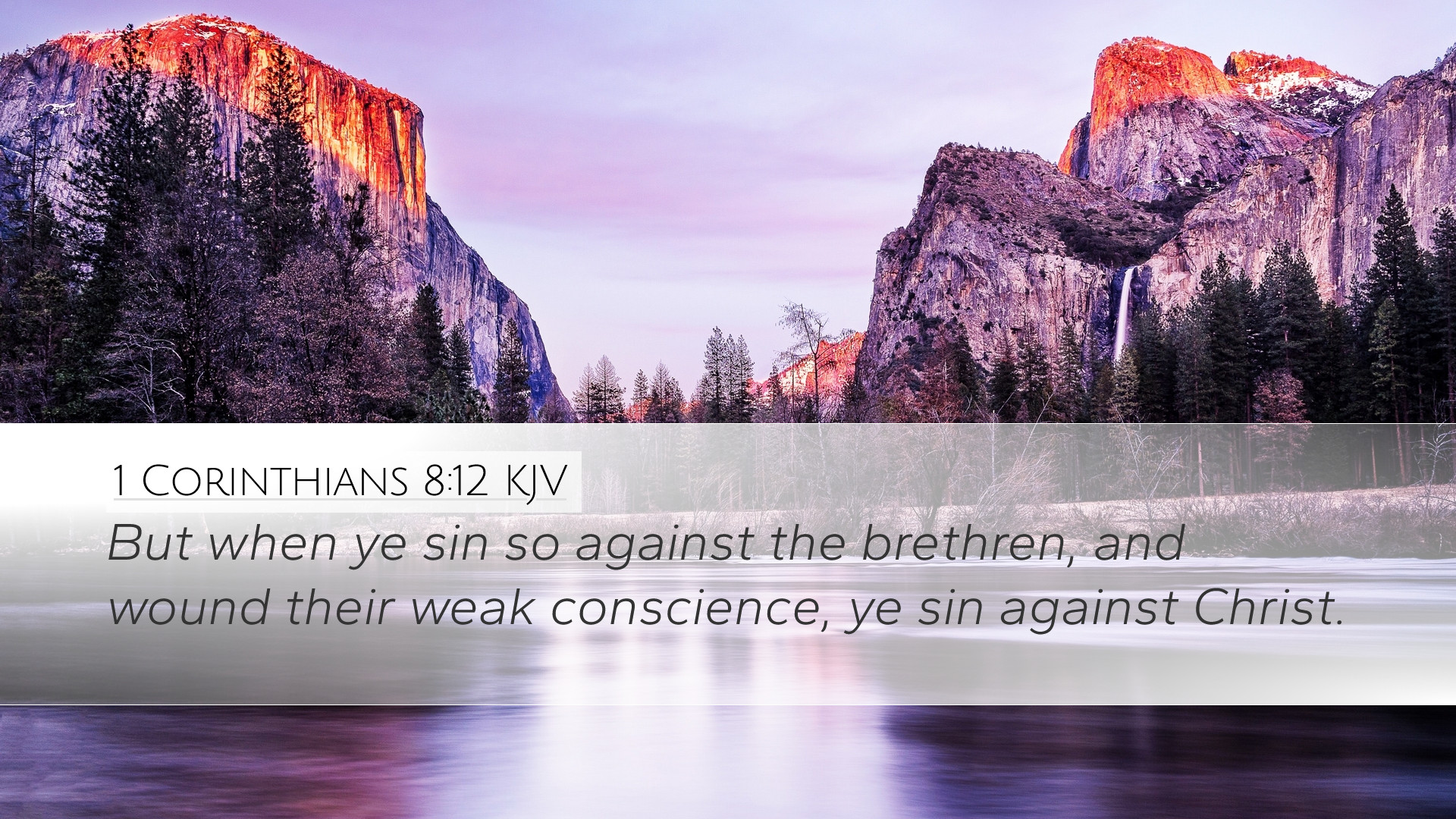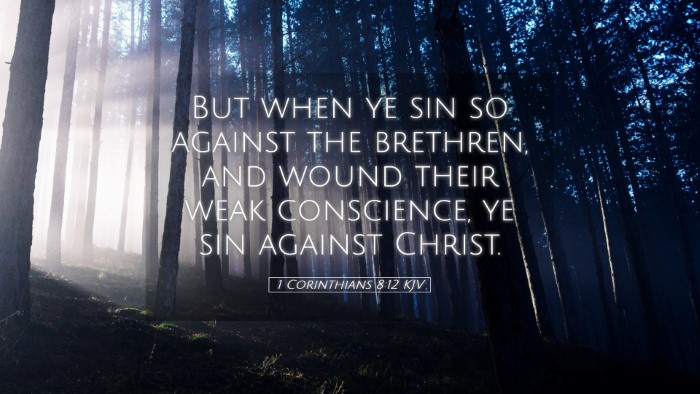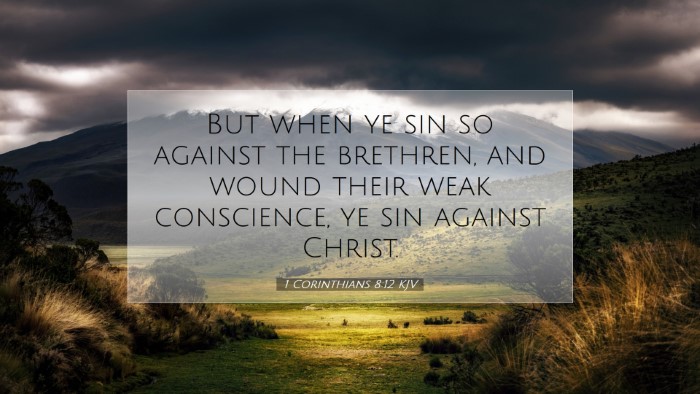Old Testament
Genesis Exodus Leviticus Numbers Deuteronomy Joshua Judges Ruth 1 Samuel 2 Samuel 1 Kings 2 Kings 1 Chronicles 2 Chronicles Ezra Nehemiah Esther Job Psalms Proverbs Ecclesiastes Song of Solomon Isaiah Jeremiah Lamentations Ezekiel Daniel Hosea Joel Amos Obadiah Jonah Micah Nahum Habakkuk Zephaniah Haggai Zechariah Malachi1 Corinthians 8:12
1 Corinthians 8:12 KJV
But when ye sin so against the brethren, and wound their weak conscience, ye sin against Christ.
1 Corinthians 8:12 Bible Commentary
Commentary on 1 Corinthians 8:12
Verse Text: "But when you sin so against the brethren, and wound their weak conscience, you sin against Christ."
Introduction
This verse from Paul's first letter to the Corinthians addresses the impact of a believer's actions on others, particularly the implications for those with a weaker conscience. The Apostle Paul emphasizes that one’s liberty, while given by Christ, must be exercised with a profound sense of responsibility towards fellow believers. This commentary synthesizes insights from public domain commentaries to elucidate the doctrinal and practical dimensions of this passage.
Contextual Background
The church in Corinth was rife with divisions and controversies regarding dietary practices, particularly concerning food offered to idols. Paul, in addressing these issues, challenges the believers to consider how their freedoms affect their brethren, highlighting a principle of love and responsibility within the community of faith.
Highlights from Matthew Henry's Commentary
Matthew Henry articulates the affection that should exist among believers, stating, "True love will make us careful of one another’s peace." In this light, Henry stresses that causing a fellow believer to stumble is akin to sinning against the Lord Himself. He asserts that believers should prioritize the spiritual health and conscience of others, demonstrating the counterbalance to Christian liberty by emphasizing love and sensitivity.
Insights from Albert Barnes' Commentary
Albert Barnes elaborates on the notion of a 'weak conscience' as one that is easily troubled by the actions of others, particularly concerning their adherence to perceived rights and wrongs. He makes a critical observation that the sin against a brother is a dual sin against God: when one wounds a fellow believer’s conscience, it not only harms that individual but also offends Christ, who identifies with His followers. Barnes notes that throughout Scripture, the notion of treating others with respect and reverence is crucial for maintaining the unity of the body of Christ.
Views from Adam Clarke's Commentary
Adam Clarke emphasizes the relational aspect of sin outlined in this verse. He notes that our actions, particularly when they lead others into error or confusion, reflect not only a personal failing but a transgression against Christ, who desires unity and love within His church. Clarke asserts that believers must be vigilant in ensuring that their behavior promotes edification rather than division, making the case for a collective responsibility in Christian practice.
Theological Implications
This verse serves as a critical reminder of the interconnectedness within the body of believers. Here are some theological implications derived from the commentary:
- Understanding of Liberty: The Christian liberty one possesses in Christ must always be tempered with love and awareness of others’ vulnerabilities.
- Sin as a Community Issue: Sin is not merely a personal matter; it has communal repercussions. Wounding a fellow believer carries the weight of a grave offense against Christ.
- Conscience and Community: The role of conscience is significant in the life of faith; thus, believers should foster environments where weak consciences are nurtured, not led astray.
Practical Applications
From the insights of these commentaries, several practical applications emerge for pastors, students, theologians, and scholars:
- Teaching on Christian Liberty: Encourage teachings that balance Christian freedoms with the necessity of love and concern for the spiritual well-being of others.
- Fostering Community Awareness: Create spaces within congregations where believers are aware of each other’s struggles and dilemmas, actively encouraging an atmosphere of care.
- Accountability Structures: Establish frameworks within church communities that hold members accountable for their actions and their effects on others, ensuring that the body operates in unity.
Conclusion
1 Corinthians 8:12 profoundly illustrates the interconnectedness of the Christian faith and communal living. The insights from Matthew Henry, Albert Barnes, and Adam Clarke reinforce the notion that our liberties in Christ should always be guided by love for our brothers and sisters. As shepherds, theologians, and students of the Word, it is imperative to remember that our actions in the community are reflective of our relationship with Christ. Thus, the charge remains clear: act in love and concern, for to sin against our brethren is to sin against Christ.


